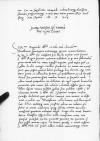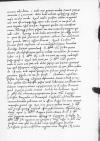Quod me Serenissima Maiestas Vestra novissimis suis ⌊⌋ de nuptiis[1] certo futuris serenissimae ⌊maiestatis regiae iunioris⌋ certiorem reddiderit et quod eam sollicitudinem, quam varius mihi hic rumor ingessit, maxime quod nescio, quid ex ⌊Gallia⌋ de alio coniugio tractari ferebatur[2], ex animo meo excusserit, quas possum, gratias habeo. Factusque hinc alacrior atque etiam Deo gratia in valetudine firmior, ad profectionem et ad ducend(um) choros sum paratior, quamvis nondum humeri et scapulae, unde adhuc manus praepedita me dictatura uti cogit, noxiis humoribus graventur, quos tamen sole redeunte calentiore dissolvi spero. Neque adhuc desunt vomicae pedibus, quibus sine pedibus cyathi (ut clementer iocatur Serenissima Maiestas Vestra) superiori tempore causam fortassis dederunt, quos quidem humores iam incenis et abstemius a reditu ex ⌊Wratislavia⌋ victu leviore relictis acepodibus diluo mutatoque more pristino alium me induere pro status et aetatis condicione proque salutis ratione non adeo necessitas, quantum voluntas adegit. Longe alia mens hominibus in domestica atque aulica vita innascitur, cuius iam prorsus pertaesus extra privatos parietes me exserere, si fieri possit, minime cupio, ut tamen priusquam e vivis cessero, ⌊Serenissimas Maiestates Vestras⌋ vel semel adhuc videre reverenterque coram  BJ, 6657, f. 395r venerari mihi detur (modo non gravior morbus itineris patiens intercedat) ⌊Cracoviam⌋, Deo benevolente, quibuscumque possim modis, me duci, curabo.
BJ, 6657, f. 395r venerari mihi detur (modo non gravior morbus itineris patiens intercedat) ⌊Cracoviam⌋, Deo benevolente, quibuscumque possim modis, me duci, curabo.
Quid medici praestare valeant, incognitum mihi non est, eorumque itaque opera utor rarius et iam fere ab annis triginta usus non sum. Languores quidam non mortiferos curare doloresque sedare possunt, non item terminum prorogare, qui nulli cedit. Cumque haud dubie moriendum sit, absque cruciatu, quem illi suis pharmacis morituro addunt, hinc evolaturus sum, quando Deus iusserit liberius.
Quod cardinalatum aliumve statum ampliorem ad accumulandos honores honoribus divitiisque divitias, quemadmodum Serenissima Maiestas Vestra scribit, praeter aliorum ecclesiasticorum morem videor non ambire, sic revera habet, et si Serenissima Maiestas Vestra recte meminit, me numquam ambitiosum fuisse agnoscet. Quod Dominus Deus per ⌊Serenissimas Maiestates Vestras⌋,
cf. Vulg. Prv 21:1 Sicut divisiones aquarum, ita cor regis in manu Domini; quocumque voluerit inclinabit illud ⌊quarum corda in manu eius suntcf. Vulg. Prv 21:1 Sicut divisiones aquarum, ita cor regis in manu Domini; quocumque voluerit inclinabit illud ⌋
, mihi dedit, suscepi non invitus, ignorans tum quid susceperim et quam gravem provinciam, de qua seria reddenda est ratio, mihi imponi permiserim, sed
cf. Vulg. Rm 9:20 numquid dicit figmentum ei qui se finxit : Quid me fecisti sic ⌊non potest dicere figmentum figulo, cur me sic fecisticf. Vulg. Rm 9:20 numquid dicit figmentum ei qui se finxit : Quid me fecisti sic ⌋. Ambitio, cupiditas, fastus, luxus atque religionis observantia tenuis admodum ac modica, quibus ecclesiastici passim vitiis laboramus, turbulenta haec dederunt tempora, utinam resipisceremus, ne id nobis Romanis, quod Graecis accidit, eveniat. Sed de his hactenus.
Quod Serenissima Maiestas Vestra clementem propensionem suam domino ⌊Georgio Schefke⌋ burgrabio et praeconsuli Gedanensi ad humilem meam commendationem pollicetur, ut in officio regio hoc anno maneat, immensas gratias ago. Qua in re paucis nudius tertius Serenissimae Maiestati Vestrae ⌊⌋, cumque eiusmodi officii postulationem ⌊magistratus Gedanensis⌋ apud Serenissimam ⌊Maiestatem Regiam⌋ faciet, iterum de eo Serenissimae Maiestati Vestrae suggeram mentionem ipsumque dominum ⌊Georgium Schefke⌋ Serenissima Maiestas Vestra sibi ingratum non agnoscet.
Utque iussis Serenissimae Maiestatis Vestrae satisfiat, nova, quae his diebus accepi, perstringam brevibus. Scripseram prius conflictum magnum inter ⌊Anglos⌋ et ⌊Scotos⌋
 BJ, 6657, f. 395v
commissum fuisse, de victoria tamen, ad quam tum partem inclinaverit, non constitisse. Nunc primum allatum est, excedentes e ⌊Scotia⌋ ⌊Anglos⌋ subsecutos fuisse Scotos cum ⌊rege⌋ et copiis omnibus. Quod postquam ⌊Angli⌋ compertum habuissent, in duas se partes divisisse, persequentesque ⌊Scotos⌋ in medium sui recipientes fortiter invasisse, vertisseque in fugam, in qua rex graviter saucius fertur occubuisse, cum eoque multitudinem ingentem, captos esse duces quattuor et comites viginti quattuor, qui perducti in ⌊Angliam⌋ a ⌊rege⌋ inibi novis vestibus induti ac sigillatim quisque eorum viro cuipiam in Anglia principi in custodiam datu ms. o(!)
⌈uu ms. o(!)
⌉s, baculos candidos in manibus pro spectaculo publice circumferre. Quicquid in his postea adferetur, Serenissimam Maiestatem Vestram latere non sinam.
BJ, 6657, f. 395v
commissum fuisse, de victoria tamen, ad quam tum partem inclinaverit, non constitisse. Nunc primum allatum est, excedentes e ⌊Scotia⌋ ⌊Anglos⌋ subsecutos fuisse Scotos cum ⌊rege⌋ et copiis omnibus. Quod postquam ⌊Angli⌋ compertum habuissent, in duas se partes divisisse, persequentesque ⌊Scotos⌋ in medium sui recipientes fortiter invasisse, vertisseque in fugam, in qua rex graviter saucius fertur occubuisse, cum eoque multitudinem ingentem, captos esse duces quattuor et comites viginti quattuor, qui perducti in ⌊Angliam⌋ a ⌊rege⌋ inibi novis vestibus induti ac sigillatim quisque eorum viro cuipiam in Anglia principi in custodiam datu ms. o(!)
⌈uu ms. o(!)
⌉s, baculos candidos in manibus pro spectaculo publice circumferre. Quicquid in his postea adferetur, Serenissimam Maiestatem Vestram latere non sinam.
Ex ⌊Suecia⌋ dicitur ⌊illum⌋, qui se pro rege gerit, cum subditis tumultuantibus quasi concordiam et reconciliationem peteret, conventum instituisse dissimulataque fraude primores viros et gentis huius ductores in profectione ad conventum occidi curavisse, fuisseque quosdam occisos, qui praecesserant, non magni momenti viros, quod cum potiores, qui subsequebantur, intellexissent, omnibus viribus et copiis suis collectis ⌊Stokhelmum⌋ castrum et civitatem eius regni praecipuam, in qua rex ille se continet, acriter in praesens obsidere. Qui sit futurus exitus, tempus docebit.
⌊Ducem Iuliacensem⌋ opera confoederatorum numerosum conscribere militem ferunt contra ditiones caesareas Belgicas, verum sine nervo militemque ab illo confugere eo, ubi stipendia solvuntur, quae apud Caesareos quam apud ⌊Saxonem⌋, ⌊Hessum⌋ et ipsum Iuliacensem sunt paratiora et in copia feliciore.
Sic adhuc totus fere orbis noster Christianus turbulentis fluctibus exagitatur magnamque in se irruendi infidelibus praebet oportunitatem. A quorum vi efferataque ferocia, quod nos Dominus Deus pro nobis pugnans (quia nulla salus in homine) defendere ac tueri velit, summis precibus est contendendum.
Qui ut eandem Serenissimam Maiestatem Vestram diutissime
 BJ, 6657, f. 396r
prosperrimeque valentem atque florentem conservet, intime precor meque eiusdem Serenissimae Maiestatis Vestrae gratiae quantum diligentius demissiusque possum, humiliter commendo.
BJ, 6657, f. 396r
prosperrimeque valentem atque florentem conservet, intime precor meque eiusdem Serenissimae Maiestatis Vestrae gratiae quantum diligentius demissiusque possum, humiliter commendo.
 BJ, 6657, f. 395r venerari mihi detur (modo non gravior morbus itineris patiens intercedat)
BJ, 6657, f. 395r venerari mihi detur (modo non gravior morbus itineris patiens intercedat)  BJ, 6657, f. 395v
commissum fuisse, de victoria tamen, ad quam tum partem inclinaverit, non constitisse. Nunc primum allatum est, excedentes e
BJ, 6657, f. 395v
commissum fuisse, de victoria tamen, ad quam tum partem inclinaverit, non constitisse. Nunc primum allatum est, excedentes e  BJ, 6657, f. 396r
prosperrimeque valentem atque florentem conservet, intime precor meque eiusdem Serenissimae Maiestatis Vestrae gratiae quantum diligentius demissiusque possum, humiliter commendo.
BJ, 6657, f. 396r
prosperrimeque valentem atque florentem conservet, intime precor meque eiusdem Serenissimae Maiestatis Vestrae gratiae quantum diligentius demissiusque possum, humiliter commendo.



